Real Horoscopes and Your Date of Birth Explained
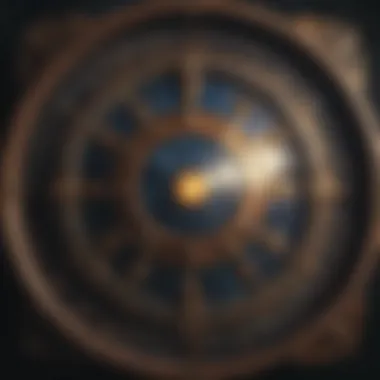
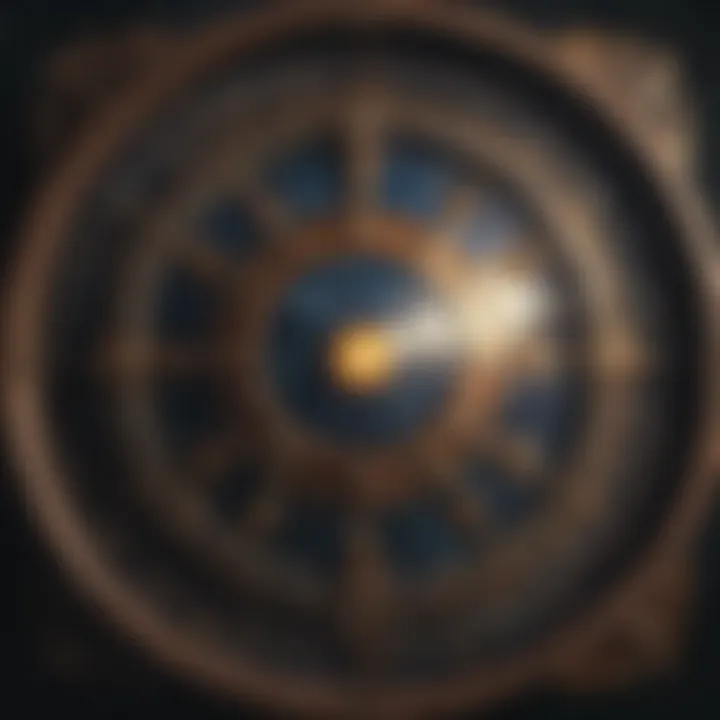
Intro
Astrology carries a timeless allure that attracts individuals seeking to make sense of their existence and relationships. The idea that celestial bodies impact human lives prompts a deeper understanding of ourselves and the cosmos we inhabit. Each of us, with our date of birth, is connected to a unique astrological profile that influences various aspects of our lives, from personality traits to future possibilities. This article aims to dig into the depths of real horoscopes tied to our birth dates, be it for self-reflective guidance or the profound insights they can offer.
In navigating through the cosmos, we will focus on crucial components like sun signs, moon signs, and rising signs to create a well-rounded picture of one’s astrological identity. These elements work in unison, shedding light on our strengths, weaknesses, and even compatibility with others.
"Astrology is just a finger pointing at reality."
—The Universe, as some might say.
By examining the intricacies of birth charts, personal connections, and the influence of significant astronomical events, we want to equip you, the reader, with a comprehensive guide. Learning how to interpret horoscopes not only aids in personal development but also enriches relationships, providing clarity and direction in the chaotic dance of life.
Let’s embark on this journey of mutual discovery and understanding as we delve into the new wisdom that the stars have to offer.
Preface to Real Horoscopes
Understanding the intricacies of real horoscopes goes beyond mere fascination with celestial bodies. This topic delves into how the movements of planets and stars relate to our individual experiences and personality. At first glance, one might think horoscopes are just generic advice in daily newspapers. Yet, when we look deeper into real horoscopes, the value becomes evident. Horoscopes link our birth data with universal patterns, offering insight not only into our strengths and weaknesses but also guiding us through life’s challenges.
What makes this topic pivotal? For one, real horoscopes provide a roadmap tailored to each individual, connecting the cosmic dance of planets to personal destiny. When we speak of horoscopes, we're not just throwing around vague astrological notions; we’re talking about deeply personal reflections that can illuminate one’s path. Noticing how celestial movements correlate with experiences can lead to significant self-discovery. It’s like having a compass that can sometimes steer you away from rough seas.
Definition of Real Horoscopes
A real horoscope is essentially a snapshot of the sky at the exact moment a person is born. This includes not only the zodiac sign traditionally associated with one’s birth date but also the positions of all the significant celestial bodies, namely the Sun, Moon, and planets. Each component contributes to the rich tapestry of a person’s astrological profile. In essence, real horoscopes offer detailed astrological insights shaped uniquely by an individual’s birth time and location.
In a more technical sense, real horoscopes assemble a myriad of astrological factors, combining them into a cohesive narrative. This narrative informs us not only of one's sun sign but fleshes out their character traits and life potential.
Importance of Birth Data
Having accurate birth data is crucial when it comes to interpreting real horoscopes. When you know the precise date, time, and place of birth, it allows for a more developed and personalized analysis. Think of it as the foundation of a house; without solid ground, everything built on top could be unstable. The minute details in birth data, such as whether someone was born at dawn or dusk, or even variations in geographical location, can shift interpretations.
Consider this: if two individuals share the same sun sign but have different Moon signs or rising signs due to variations in birth data, they might as well be from different planets when it comes to personality traits and life challenges.
_"Astrology really is a map to self-understanding; Without precise data, it’s like trying to read a sophisticated novel in a language you barely know."
Thus, emphasizing the right birth information enhances the authenticity of the horoscopic reading, resulting in a more relevant and insightful lifeline. This level of attention not only validates astrological claims but also emboldens individuals to embrace their celestial narrative with confidence.
The Basics of Astrology
Astrology serves as a bridge connecting celestial events with human experiences, an intricate tapestry woven from the movements of heavenly bodies. When we step into the realm of astrology, it's akin to opening a door to understanding ourselves on a deeper level. The nature of this ancient practice is rooted in the belief that the positions of planets and stars at the moment of our birth can shape our personalities, temperaments, and even destinies. Thus, the basics of astrology are pivotal, as they craft the foundation upon which entire personal narratives and worldviews are built.
Key Concepts in Astrology
To navigate astrology successfully, one must be familiar with some key concepts. Understanding these concepts allows enthusiasts to decipher the complex interplay of celestial influence.
- Planets: Each of the planets, from Mercury to Pluto, represents different aspects of our personality. For instance, Venus speaks to love and beauty, while Saturn governs discipline and structure.
- Signs: The twelve zodiac signs, ranging from Aries to Pisces, reflect specific traits and characteristics. Each sign has its unique energy, influencing how we express ourselves and relate to others.
- Houses: The astrological chart is divided into twelve houses, each corresponding to different areas of life, such as relationships, career, and home. The house where a planet resides offers insight into how its influence plays out in our daily life.
- Aspects: These are the angles formed between planets in a chart. They symbolize the relationship between various celestial influences and can manifest as harmonious or challenging dynamics.
- Transits: As planets move through the sky, they create new relationships with our natal planets, impacting our lives in real time. Tracking these transits frequently offers guidance on upcoming opportunities or hurdles.
Understanding these foundational elements is like laying the first bricks of a sturdy house. Without grasping the core principles, the rest of the structure—interpretation of charts, predictions, and personal insights—remains shaky and uncertain. By getting comfortable with these concepts, one can begin to appreciate the holistic nature of astrological practice.
The Zodiac Wheel Explained
The Zodiac Wheel is pivotal in astrology, acting as a roadmap for interpretation. Imagine it as a clock, with each sign occupying 30 degrees of a full 360-degree circle. The layout of the Zodiac Wheel is not just symbolic; it is vital for pinpointing where each celestial body resides at any given moment.
- The Signs: Each of the twelve signs is represented in the wheel, starting with Aries at the top and moving clockwise through the list: Taurus, Gemini until Pisces completes the circle.
- Symbolism and Elements: Each sign belongs to one of the four elements: Fire, Earth, Air, and Water, which inform the sign's fundamental characteristics.
- Cardinal, Fixed, and Mutable Quality: Signs are also categorized as Cardinal, Fixed, or Mutable. Cardinal signs initiate, Fixed signs maintain, and Mutable signs adapt, further focusing the energy they embody.
Using the Zodiac Wheel, one can begin to understand not just their own energies, but also those of others. This wheel is a vital component in birth chart analysis, revealing how individuals relate to the cosmos and, by extension, the world around them.
In summary, grasping the basics of astrology is more than an academic exercise; it’s a pathway to self-awareness. When one understands the foundations of astrology, they can better comprehend their place within the universe and the unique energy they bring to it.
Understanding Sun Signs
When delving into the world of astrology, the concept of sun signs is almost like the first sip of a gradually unfolding narrative. Each sun sign represents not just a piece of your astrological makeup, but a window into your personality, strengths, and weaknesses. Recognizing your sun sign is a foundational step in understanding real horoscopes; it acts as the beacon that guides personal reflection and growth.
Grasping the significance of sun signs is critical for astrologers, tarologists, and esotericists alike. Each sun sign functions like a primary character in a larger story—your life's journey—shapes influences from the cosmos that can inform personal choices, interactions, and even career paths.
The Role of Sun Signs in Astrology
Sun signs can be thought of as the stage upon which your personal traits perform. The sun's position at your time of birth denotes not merely a location on the zodiac; rather, it indicates the essential traits you exhibit. Each of these twelve signs brings its unique flavor to your life. For instance, a Leo, ruled by the sun, might have a natural flair for leadership and exuberance, while a Virgo, under Mercury’s influence, may exhibit a more analytical approach to life.
In practical terms, understanding one’s sun sign can provide clarity and a sense of purpose. It can help to clarify questions such as, "Why do I feel more alive in collaborative settings?" or "What drives me to seek perfection?" These understandings can empower individuals to navigate relationships and careers more effectively. Sun signs also serve as an excellent tool for compatibility discussions among partners, friends, or colleagues.
"Your sun sign is more than just a label; it's the core essence of who you are."
Characteristics of Each Sun Sign
Each sun sign comes with a rich tapestry of characteristics. Here’s a quick look at what shapes each sign:
- Aries (March 21 - April 19): Bold and adventurous, they often lead the pack, don’t shy away from challenges.
- Taurus (April 20 - May 20): Resourceful and dependable, they appreciate the finer things in life.
- Gemini (May 21 - June 20): Adaptable, they dual nature often makes them intriguing conversationalists.
- Cancer (June 21 - July 22): Intuitive and emotional, they create a nurturing environment.
- Leo (July 23 - August 22): Confident and charismatic, they're natural-born leaders.
- Virgo (August 23 - September 22): Detail-oriented and analytical, they seek perfection in their endeavors.
- Libra (September 23 - October 22): Diplomatic and fair-minded, they enjoy harmony in relationships.
- Scorpio (October 23 - November 21): Intense and secretive, they often delve deeply into what others might overlook.
- Sagittarius (November 22 - December 21): Free-spirited and curious, they possess a wanderlust for life and learning.
- Capricorn (December 22 - January 19): Ambitious and disciplined, they strive for success in structured environments.
- Aquarius (January 20 - February 18): Innovative and forward-thinking, they often challenge societal norms.
- Pisces (February 19 - March 20): Compassionate and artistic, they tap into the realm of emotions and dreams.
Understanding these characteristics allows us deeper insights into personal and interpersonal dynamics. Armed with knowledge about your sun sign and the signs of those around you, interacting with different personalities becomes less of a guessing game and more of a path to harmonious exchanges.
The Influence of Moon Signs
The influence of moon signs in astrology cannot be ignored, as they provide a deeper understanding of our emotional landscape and intuitive reactions. While many people are primarily aware of their sun signs, the moon sign plays a crucial role in shaping our inner selves, often revealing the traits that we do not readily showcase to the outside world. These signs are rooted in the location of the moon at our birth, which thrives beyond the surface representation of the sun's shining light.
Understanding the nuances of moon signs leads to benefits such as enhanced self-awareness, better emotional regulation, and improved relationships. For individual growth, reflecting on traits attributed to one’s moon sign can shed light on why certain feelings arise or why conflicts may emerge in personal relationships. If treated with care, this knowledge serves not only as a tool for self-discovery but also as a guide to navigating the complexities of life.
Meaning Behind Moon Signs
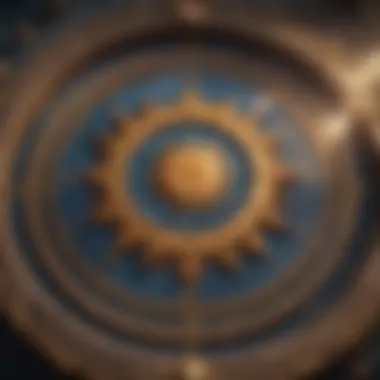
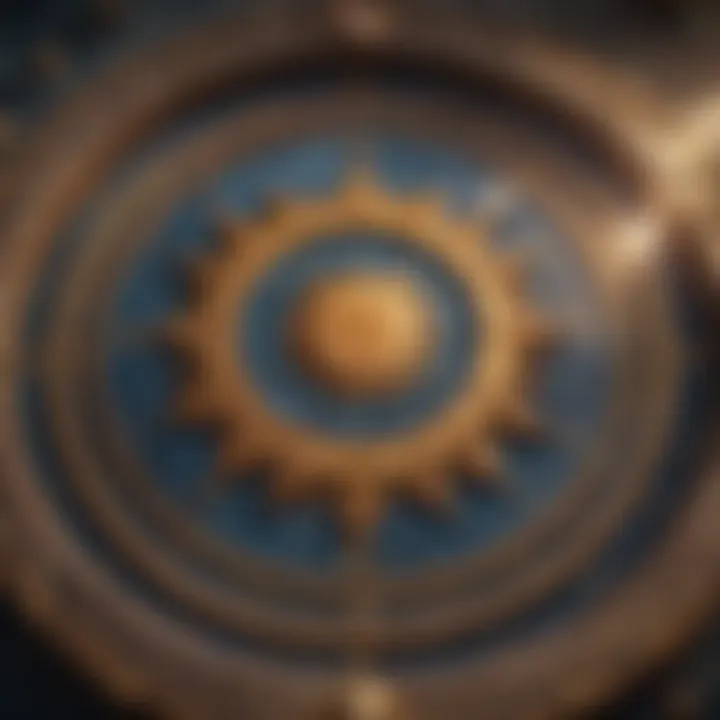
Moon signs dive into the emotional self, offering rich insights into how we react when the chips are down. Each sign carries specific emotional flavors. For instance, a person with their moon in Cancer may feel deeply, while someone with a lunar presence in Aries might react impulsively. Here��’s a snapshot of the moon signs and their emotional tendencies:
- Aries: Action-oriented, can seem aggressive when hurt.
- Taurus: Seeks stability, avoids conflict, prefers comfort.
- Gemini: Adaptable but can be flighty; communication is vital.
- Leo: Emotionally generous, craves validation and attention.
- Virgo: Analytical, critical of self, seeks order in emotions.
Grasping these distinctions not only caters to one's emotional intelligence but also empowers individuals to articulate their feelings more transparently.
Emotional Depth and Moon Signs
The relationship between moon signs and emotional depth is intricate. Each lunar sign holds unique challenges and strengths. Often, people may overlook how their emotional responses can profoundly influence decisions, relationships, and personal outlook. For example, those with moon signs in Scorpio may have intense feelings and a penchant for delving into life's mysteries, experiencing a heightened sensitivity to their environment.
"Our moon signs reveal how we nurture ourselves and others, showcasing both strengths and vulnerabilities that we may not wish to expose."
Moreover, individuals might often find comfort in learning about their moon signs during challenging times. A Capricorn moon might develop resilience over practical solutions during crises, whereas a Pisces moon may approach difficulty with empathy and intuition, seeking connection through emotional expression.
Acknowledging these emotional undercurrents not only guides people toward managing their feelings but also equips them to understand the emotional needs of those around them. In a world that can feel overwhelming, the moon sign serves as a celestial anchor, urging individuals to honor their feelings while also keeping them aware of the emotional dynamics in their relationships.
Rising Signs and Their Significance
Rising signs, often called the ascendant, hold a critical spot in the intricate tapestry of astrology. They serve as the veil through which an individual presents themselves to the world, acting almost like a mask. Unlike the sun sign, which speaks to one's core personality, or the moon sign, which captures our emotional depths, the rising sign provides insight into the first impressions we create. It's about how others perceive us and how we approach new situations. This aspect of astrology can guide personal branding, social interactions, and even career choices. Without this understanding, one might find themselves misaligned with how they want to be seen versus how they are actually perceived.
What are Rising Signs?
Rising signs are determined by the exact time and place of one's birth. This astrological mark changes roughly every two hours, meaning that two people with the same sun and moon signs could still present very differently if their rising signs differ. To pinpoint a rising sign, one needs to cast a birth chart, which highlights not only the sun and moon's positions but also the specific zodiac sign that was ascending on the horizon at the moment of birth.
The significance of the rising sign is multifaceted. On a fundamental level, it represents the outer persona—how we engage with the world and how others see us. For instance, an Aries rising may come off as bold and assertive, while a Pisces rising may be viewed as sensitive and dreamy. This instant reaction from others can greatly influence our social interactions and relationships.
How Rising Signs Shape First Impressions
The importance of first impressions cannot be overstated. Our rising sign plays a pivotal role in forming those initial perceptions. Imagine walking into a room; your presence is felt even before you say a word. A person with Leo rising might command attention, exuding charisma and flair, while someone with Virgo rising might project a more reserved and analytical demeanor.
Here’s a short list of how different rising signs can shape first impressions:
- Aries Rising: Bold, adventurous, and often seen as a leader. They can capture attention right away.
- Taurus Rising: Grounded and calm, this sign often comes across as reliable and friendly.
- Gemini Rising: Quick-witted and fun, they immediately engage others in conversation and laughter.
- Libra Rising: Known for their charm and grace, they often create a welcoming atmosphere.
In other words, understanding one's rising sign is more than just an intriguing fact—it's a tool for navigating social realms.
"Your rising sign is the first glimpse the world sees of your potential and your unique way of engaging through life."
Knowing this can aid individuals in tailoring their interactions and aligning their outer persona with their true selves. This alignment not only paves the way for smoother personal relations but also increases the likelihood of achieving personal ambitions.
As we proceed in exploring the astrological landscape, it's essential to make note of the rising sign's significance. It intricately weaves into the larger picture of one’s astro-identity, guiding decisions, relationships, and self-perception.
The Creation of a Birth Chart
The creation of a birth chart is a pivotal aspect of astrology, forming the foundation upon which individual horoscopes are built. Each chart is unique, designed to reflect the celestial positions at the exact time and place of a person's birth. This specificity makes understanding your birth chart not just a matter of curiosity, but also a profound tool for self-discovery. By examining the celestial alignments, one can gain insight into personality traits, potential challenges, and life opportunities.
A birth chart, also known as a natal chart, is like a snapshot of the cosmos when a person entered the world. Each component of the chart corresponds to different aspects of a person’s life and characteristics. The importance of birth charts lies in their ability to provide a detailed map of the potential pathways in life, which can help individuals make more informed decisions as they navigate through various phases.
Components of a Birth Chart
A birth chart is composed of several key components, each of which carries significant meaning. Here are the primary elements:
- The Twelve Houses: Each house represents different areas of life, such as relationships, career, and personal identity. For example, the first house relates to self-image, while the seventh house concerns partnerships.
- The Planets: The planets in your chart symbolize forces that influence your personality and life experiences. The Sun, Moon, and each planet has its own energies and characteristics that affect various aspects.
- The Signs: Every planet resides in one of the twelve zodiac signs, adding their influence to the planet’s energy. For instance, a Mars in Leo can manifest a desire for recognition and leadership.
- Aspects: These are angles formed between the planets, indicating how they interact with each other. Positive aspects might enhance energies, while challenging aspects could signal potential conflicts or tensions.
This layered complexity means that two people born on the same day might still have very different experiences based on the unique configuration of their birth charts.
Interpreting the Birth Chart
Interpreting a birth chart is an art and a science, requiring both knowledge of astrological principles and intuition. The first step in this process is to identify the ruling sign of each house, as this provides context for understanding the various life areas they represent. Afterward, the position of planets within the signs and houses reveals more about an individual's traits and life lessons.
For instance, if Venus is located in the fourth house, the individual may find comfort and pleasure in home and family life. On the other hand, a Saturn placement in the seventh house could indicate lessons around commitment and relationships.
Understanding how the aspects form a dialogue between different celestial bodies is also crucial. By analyzing whether aspects are harmonious or challenging, one can ascertain where the individual might excel or face obstacles.
"A birth chart is more than a map; it's a toolkit for navigating the treacherous waters of life. Each aspect, each planetary position, unlocks another door to understanding one's true self."
Astrology and Personality Traits
Astrology offers a fascinating lens through which to view personal traits and behaviors. The fundamental belief behind astrology is that our lives are influenced by celestial bodies and their alignments at the moment of our birth. When we talk about astrology and personality traits, it’s about understanding the intricate tapestry these cosmic forces weave into our identities. Each astrological sign brings with it a set of characteristics—some are more outgoing, while others may be reserved. Recognizing these traits can empower individuals to make decisions that align with their natural inclinations, ultimately leading to a more fulfilling life.
Astrological Signs and Personal Compatibility
In astrology, compatibility is often assessed through the interaction of different signs. Each sign is paired with elemental qualities—fire, earth, air, and water—which influence how they connect with each other. For instance, fire signs like Aries, Leo, and Sagittarius tend to get along with air signs such as Gemini, Libra, and Aquarius. The interplay creates a dynamic bond, where enthusiasm meets intellect. This doesn’t mean that opposites can't attract; rather, understanding these elemental compatibilities can offer insights into relationships, whether romantic or platonic. People often consult their horoscopes to gauge compatibility, and while it can be eye-opening, it's essential to remember that individual experiences and communication play a significant role in healthy relationships.
Influence of Zodiac Signs on Behavior
The behaviors exhibited by individuals can often be traced back to their sun, moon, and rising signs. For example, someone with a Capricorn sun may be viewed as responsible, diligent, and organized. In contrast, their moon sign might reveal their emotional self; if it’s in Cancer, they could struggle with sentimentality or an inclination to nurture others. Thus, behaviors can shift and adapt based on these astrological influences. Additionally, rising signs, or ascendants, contribute a layer of complexity, impacting the first impressions people make.
"In astrology, every sign carries its own set of challenges and gifts, shaping who you are. It’s not just about what you see; it’s about understanding the deeper meanings represented in the stars."
Astrology thus serves as a tool for self-exploration. Through comprehension of these traits, individuals can navigate life’s hurdles better. Recognizing how one’s zodiac influences behavior provides a roadmap for personal development and interpersonal dynamics. Astrology isn't just about predictions; it’s a means of harnessing knowledge for improved relationships and personal growth.
Understanding how zodiac signs impact behavior and compatibility highlights the importance of this knowledge in both personal and social contexts. It fosters respect for individual differences and promotes harmony in relationships, proving that sometimes, the stars can lead us to deeper connections with ourselves and each other.
Celestial Events Impacting Horoscopes


Celestial events play a crucial role in shaping astrological interpretations and the meaning of horoscopes. Understanding these events allows one to appreciate how movements in our solar system can directly influence individual experiences. It’s not just about the stars in the sky; it’s about how those celestial bodies dance and shift, creating a cosmic tapestry that can guide personal destiny.
Significance of Planetary Alignments
Planetary alignments are frequently at the forefront of astrological discussions. When planets align in specific formations, it creates unique energetic patterns that can be felt on Earth. Each planet represents different aspects and influences:
- Mars often brings forth energy for action and assertiveness.
- Venus enhances themes of love and beauty.
- Jupiter tends to expand opportunities and abundance in our lives.
When these planets align, people may feel a surge in specific traits associated with them. For example, a strong alignment of Venus may foster an increase in romantic activities or artistic endeavors. Therefore, being aware of these alignments can provide insight into optimal times for decision-making or introspection.
"The cosmos has its own rhythm, one that can guide our paths if we choose to listen."
Eclipses and Their Astrological Meaning
Eclipses are another significant celestial event, bringing opportunities for transformation and profound change. They typically occur in pairs—solar and lunar—and are often seen as powerful catalysts in astrology. Solar eclipses often signify a time for new beginnings, as they align with the Sun and spark fresh energy. In contrast, lunar eclipses tend to stir up unresolved emotions and culminate what has been brewing beneath the surface.
The effects of eclipses can be felt in the months surrounding the actual event. Individuals may notice shifts in their personal lives, relationships, or career paths. This can lead to crucial turning points in life or realizations that redefine one’s journey.
Understanding when these celestial events—alignments and eclipses—occur can help practitioners of astrology customize their horoscopes for more profound insights. In doing so, one can utilize these heavenly occurrences to navigate challenges or embrace opportunities with a renewed sense of purpose.
Common Misconceptions About Astrology
Astrology often faces skepticism, as many people conflate its principles with absolute predictions or disregard it as mere superstition. However, separating myth from fact is pivotal for those interested in truly understanding this ancient art. This section will clear the fog surrounding the most common misunderstandings about astrology, laying a solid foundation for better realization of horoscopes and personal traits derived from them.
Astrology vs. Astronomy
Astrology and astronomy share a common ancestry, yet they diverged long ago. Astronomy is the scientific study of celestial bodies, governed by laws and measurable phenomena. It deals with accurate calculations of the positions of planets and stars, laying down the groundwork for astrobiological studies and space exploration.
Astrology, on the other hand, revolves around interpreting these celestial movements and their supposed influence on human affairs. This doesn’t mean one is subordinate to the other; indeed, they play distinct roles. While astronomy provides tools for understanding the universe physically, astrology seeks to understand personal and social dynamics in relation to these cosmic events.
In essence, astronomy counts the stars, while astrology attempts to chart a course through their implications. This distinction highlights how both disciplines can coexist, each feeding into humanity’s curiosity about the cosmos.
The Difference Between Horoscopes and Astrology
When one talks about horoscopes, they often mistakenly use the term interchangeably with astrology. However, horoscopes are a more specific component within the broader field of astrology. A horoscope is a personalized chart based upon the date, time, and location of an individual's birth, showcasing the positions of celestial bodies at that moment.
Astrology itself encompasses a variety of practices, principles, and beliefs, including ye olde natal astrology, mundane astrology, and electional astrology. Here’s a quick look at some distinctions:
- Scope: Astrology is a broader field; horoscopes are a part of it.
- Purpose: Astrology analyzes cosmic influences; horoscopes offer personal insights.
- Formulation: Horoscopes are crafted using astrological principles to reflect individual circumstances, whereas astrology encompasses historical texts, theories, and ongoing interpretations of celestial movements.
"Understanding the difference between horoscopes and astrology enriches one’s grasp of how personal cosmic influences shape our lives."
By clarifying these definitions and misconceptions, readers can dive deeper into the personalized meanings of their horoscopes and appreciate how they are mirrors reflecting unique experiences influenced by the cosmos.
Using Horoscopes as a Tool for Self-Discovery
Understanding how to effectively utilize horoscopes as a means of self-discovery is pivotal in recognizing one's place in the vast cosmos. Often, individuals look toward the stars in search of guidance or enlightenment about their journey in life. Many aspects of horoscopes serve as mirrors reflecting our inner selves, allowing us to peel back layers and confront both our strengths and weaknesses. When we harness this potential, we empower ourselves to navigate life's complexities with insight and clarity.
At its core, a horoscope is more than just a daily prediction; it's a comprehensive roadmap mapping out the interplay of celestial energies in our lives. Here are some specific elements to consider:
- Personalization: Each individual has a unique birth chart shaped by the precise moment they entered the world. This uniqueness allows for tailored insights that can help reinforce one's identity.
- Self-Reflection: By engaging with one's astrological data, there’s a great opportunity for introspection. Realizing how specific planetary placements influence behaviors can spark meaningful conversations with oneself.
- Growth Opportunities: Understanding astrological aspects can reveal areas where personal growth is needed. The compatibility with certain zodiac signs might provide insights into relationships, both personal and professional.
The key benefits include gaining a clearer perspective on past behaviors and future potentials while instilling confidence in personal choices. It's less about fatalism and more about awareness that guides actions.
Empowerment Through Understanding
Empowerment through understanding is a crucial takeaway from engaging with horoscopes. When one possesses knowledge of their astrological makeup, a sense of agency develops; individuals feel more in control of their life decisions. For instance, knowing one’s moon sign can reveal emotional triggers, helping to tackle stress or anxiety heads-on. This self-awareness equips people to respond to their environment in more constructive ways, rather than reacting impulsively.
"When you know yourself, you can conquer the world," this could be the motto for those keen on exploring their horoscopes. They become not just followers of fate but active participants in their journeys, learning to ride the waves of challenges instead of being tossed about.
Navigating Life's Challenges with Astrology
Navigating through life’s challenges using astrology comes down to understanding the recurring patterns and cycles that horoscopes illuminate. The stars can offer guidance on the best times to make significant changes, like starting a new job or entering a relationship. For example, if Venus is in retrograde, it may be wiser to refrain from making impulsive decisions about love or finances.
Moreover, aligning decisions with astrological insights can foster resilience. When faced with adversity, individuals can look to their horoscopes to gain clarity. Rather than viewing challenges as obstacles, one can reinterpret them as cosmic lessons designed for growth. Recognizing which zodiac signs align positively with personal traits can also inform choices in collaboration and teamwork.
Ultimately, understanding the nuances of one’s horoscopes provides a practical toolkit for life. It encourages individuals to embrace challenges, make informed decisions, and take a proactive approach to their personal evolution. Through this lens, horoscopes transform from simple daily readings to profound guides for personal development.
Technological Advancements in Astrology
The rise of technology has undeniably transformed numerous aspects of daily life, and astrology is no exception. As the world becomes increasingly digital, the tools available for interpreting horoscopes and understanding astrological phenomena have evolved as well. This section explores how technological advancements in astrology have enhanced our ability to connect with celestial patterns and gain insights into our personal and collective lives.
Astrology Software and Applications
One of the most significant developments in astrological practice is the emergence of specialized software and applications. These tools have made astrology more accessible to a broader audience, allowing both seasoned astrologers and curious newcomers to delve into astrological studies with ease.
- User-Friendly Interfaces: Most astrology software platforms prioritize intuitive navigation. For instance, applications like Solar Fire and Astro Gold present complex data in visually appealing formats, making it simpler for users to interpret their charts.
- Accurate Calculations: Gone are the days of using logarithmic tables or manual calculations. These programs automate computations, ensuring precision in chart casting, crucial for accurate horoscope creation.
- Customization Options: Software like TimePassages enables users to tailor their astrological experiences. Individuals can explore various aspects, from natal charts to relationship compatibility based on their birth data.
Moreover, advanced tools often provide features like predictive astrology, synastry comparisons, and more, giving users a rounded astrological experience all in one place. The ability to generate reports quickly has become a game-changer, catering to those who seek to understand their cosmic environments without extensive prior knowledge.
Utilizing Online Tools for Birth Charts
With a wealth of information available online, utilizing web-based tools for creating birth charts has become an everyday practice for many. Websites like AstroSeek and Astrodienst offer detailed birth chart generation services that have gained popularity for their accuracy and comprehensiveness.
Some benefits of using these online tools include:
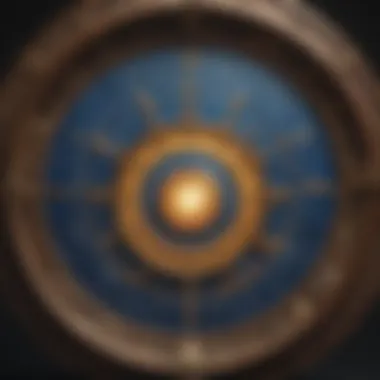
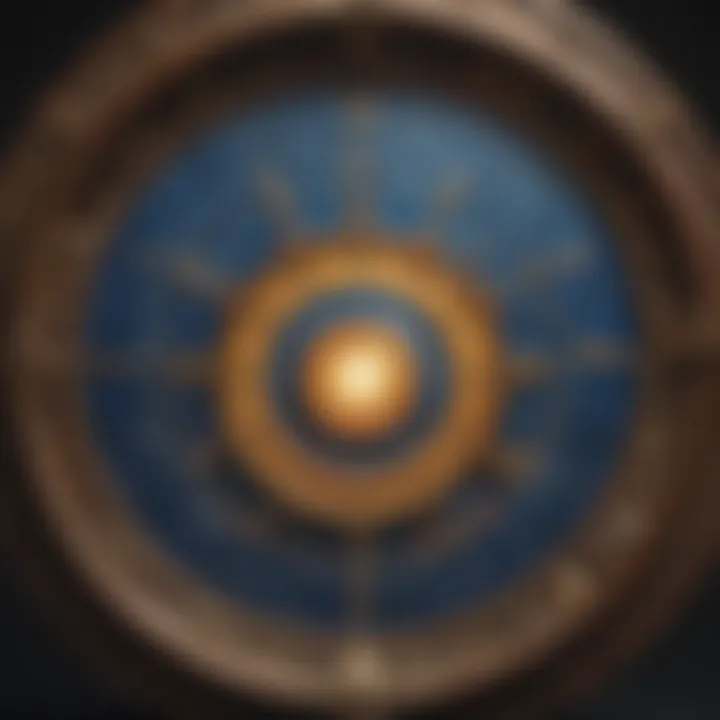
- Instant Results: Users can input their birth data and receive immediate results, eliminating the wait associated with traditional readings.
- Accessible Knowledge: Many platforms come equipped with educational resources that guide users in interpreting their charts, enriching their astrological literacy.
- Community Engagement: Many tools feature forums or chat sections, where users can discuss findings, share experiences, or pose questions, thus enriching the overall learning experience.
"Astrology is not just the study of celestial patterns; it's about making connections that help us navigate life's complexities."
Cultural Perspectives on Astrology
The intricate world of astrology is not confined to one culture or a singular interpretation; instead, it weaves through the diverse tapestry of human belief systems. Each culture brings its own flavor, infusing traditional astrological principles with unique perspectives and practices. This section delves into how astrology is woven into the social and spiritual fabric of societies around the globe, examining its relevance, benefits, and the thoughtful considerations it prompts among practitioners.
Astrology in Different Cultures
Astrology manifests in various forms across the globe, each with distinct characteristics and interpretations that reflect the values and beliefs of the cultures from which they arise. In Western astrology, the zodiac is a circle of twelve signs linked with specific celestial bodies, focusing on individual identity and personality traits. Here, astrology serves as a roadmap to understanding inner drives and behavioral tendencies, based largely on the positions of the Sun and planets at the time of one's birth.
In contrast, Vedic astrology, rooted in ancient Indian texts, emphasizes a more holistic view of an individual's path, prioritizing the moon's position over the sun’s. The concept of Dasha, or planetary periods, is central to Vedic practices, where each planet governs a specific time of life, influencing personal development in profound ways. This holistic approach often encourages individuals to reflect on their karma and life's purpose.
Moreover, in Chinese culture, astrology is synchronized with the lunar calendar and is deeply tied to concepts of Yin and Yang. The Chinese zodiac operates on a twelve-year cycle, assigning an animal to each year, which influences people's personalities and fortunes differently than in Western traditions. Each animal signifies a set of traits, and the interplay between elements—Wood, Fire, Earth, Metal, and Water—adds further layers to one's astrological reading.
This variation across cultural lenses highlights how astrology transcends mere scientific boundaries and becomes a significant facet of cultural identity. Whether guiding personal decisions or providing solace during uncertain times, astrology serves varied needs across societies.
Historical Figures and Their Beliefs in Astrology
Astrology has long captured the imaginations and convictions of many notable historical figures, shaping their decisions and influencing the course of history. From mystics and philosophers to kings and queens, the belief in celestial influence has inspired a wide range of actions. For instance, Ptolemy, a renowned Greek scholar, made significant contributions to the field of astrology with his work, Tetrabiblos, where he laid the foundation for Western astrological traditions. His approach to calculating planetary positions and their influence on human affairs is still studied today.
In the realm of politics, we cannot overlook individuals like Queen Elizabeth I, who consulted astrologers to guide her choices on matters of state. The belief that celestial events could foretell or influence earthly outcomes was common, leading even rational political leaders to seek astrological advice in shaping their destinies.
Astrology’s popularity surged during the Renaissance, when figures like Nostradamus famously made predictions, blending astrology with prophetic insight that captured the public's fascination and inspired both reverence and skepticism. His works opened a pathway for astrology's integration with medicine and psychology, as many believed aligning with the stars could enhance one’s well-being.
"In every culture and through every era, astrology has provided a link between the heavens and the earthly realm, influencing lives, decisions, and destinies in ways that continue to unfold to this day."
These historical perspectives illustrate how astrology is not merely a trivial pursuit but a profound aspect of human culture that resonates through time. Understanding its cultural significance can enrich one’s grasp of astrology, revealing not only the diversity of interpretations but also the common threads that unite humanity in their quest for self-discovery and meaning.
Ethics and Astrology
Astrology, often seen through the lens of mysticism or intrigue, also invites the need for serious consideration of ethics. The realm of astrology is not just about predictions and charts; it intertwines with personal lives and choices, often influencing beliefs and decisions. In this light, understanding the ethical landscape of astrology emerges as crucial for practitioners and enthusiasts alike. The responsibility that comes with making astrological interpretations and predictions requires a transparent framework, especially when those insights concern personal identity and future events.
Ethical Considerations in Astrological Predictions
When astrologers engage with clients or provide readings, they should recognize several ethical aspects:
- Accuracy and Honesty: It is vital that the information conveyed reflects a genuine interpretation rather than embellishments or overly optimistic views. Practitioners must communicate predictions with a balanced perspective, ensuring that their insights are reasonable and clear. A misinterpretation can lead to misguided life choices.
- Consent and Boundaries: Like any form of counseling or guidance, one must gain clear consent when discussing personal matters, particularly those involving sensitive topics. Respecting boundaries forms the backbone of an ethical practice in astrology. Practitioners should also consider their client’s comfort levels and not push for details that may be intrusive.
- Avoidance of Harm: Astrologers should strive to avoid creating fear or undue pressure through their predictions. This responsibility includes advising against making life-altering decisions solely based on astrological guidance. A practitioner who imparts knowledge responsibly empowers their clients to navigate their own lives rather than steering them blindly.
By focusing on these ethical factors, astrologers can build trust and foster more meaningful connections with their clients. The goal should always be to guide rather than dictate.
Navigating Personal Responsibility with Astrology
With the advent of modern technology, astrology is accessible to virtually anyone. While this democratization of celestial knowledge is beneficial, it opens up discussions about personal responsibility in engaging with astrology:
- Critical Thinking: Individuals should approach astrological readings with a sense of analysis and discernment. Relying solely on horoscopes can lead to making decisions without considering all available information. Encouraging clients to think critically about predictions reinforces their agency and comprehension of their unique circumstances.
- Integration of Insight: Astrology can offer valuable insights, yet it is just one piece of the puzzle. Using these insights in conjunction with other forms of knowledge—like psychology or personal experience—can empower individuals to create a rounded approach to their lives. This integrated understanding encourages a more proactive attitude, rather than passively accepting what the stars dictate.
- Emotional Responsibility: It is also crucial for users of astrology to manage their emotional responses to predictions. The tendency to become overly influenced by astrological insights can cloud judgments or create anxieties where none need exist. Individuals are tasked with recognizing their own emotions and responding to astrological messages without allowing them to dominate their mental space.
"Astrology gives us a map, but it is up to us to choose our path."
In summary, ethics and personal responsibility weave together to form a guiding principle in astrology. By adhering to ethical considerations while nurturing personal accountability, both practitioners and clients can engage in a healthier, more constructive exploration of astrology.
Future Trends in Astrology
The realm of astrology, like all things in life, is subject to change and evolution. Understanding future trends in astrology is essential for enthusiasts and professionals alike. It’s not just about reading the stars; it's about comprehending how contemporary shifts can inform personal practices and enhance predictive accuracy. With each generation, new perspectives emerge, breathing life into traditional concepts and adapting them to suit modern contexts.
The Growing Popularity of Astrology
Astrology has seen a notable surge in interest over the last few years. This rise can be attributed to various factors, from the proliferation of social media platforms where astrological content is easily accessible, to a general cultural shift towards self-exploration and mindfulness.
- Accessibility: With apps like Co-Star and The Pattern, personalized astrological readings have become a part of daily life for many, simplifying complex astrological themes into bite-sized insights.
- Community Engagement: Platforms such as Reddit have created spaces for discussion, verification of personal experiences, and sharing of insights. This communal aspect encourages users to delve deeper into understanding their horoscopes and their intrinsic cosmic connections.
- Celebrity Influence: Influencers and public figures discussing astrology have made it mainstream, sparking curiosity among those who may have previously viewed it as esoteric.
The increasing interest is not only indicative of a thriving community but also highlights astrology's potential as a lens through which individuals can view their personal journeys and relationships.
Innovations in Astrological Practices
As society evolves, so too does the practice of astrology. Innovations are steering astrology into uncharted waters, fundamentally altering how readings are approached.
- Data-Driven Astrology: With the advent of big data, some astrologers are harnessing algorithms to analyze celestial movements and user data, enriching traditional horoscopes with statistical insights. This combination creates more personalized and precise predictions.
- Integration with Technology: Virtual reality and augmented reality have begun making waves in astrology, creating immersive experiences for users to visualize celestial movements and interact with their birth charts in 3D.
- Holistic Approaches: There’s also a growing trend towards combining astrology with other practices, such as tarot reading or meditation. This cross-pollination enriches the depth of readings and broadens the appeal of astrology to people seeking multifaceted spiritual tools.
"Astrology isn’t static; it breathes with the changes of humanity. Embracing innovations allows us to keep pace with the cosmos, ensuring that our understanding grows alongside the stars."
Culmination
Bringing everything together, the concept of real horoscopes by date of birth emerges as a fascinating blend of astrology and personal introspection. The intricate relationship between celestial movements and human behaviors is not just a whimsical notion; it forms the backbone of our understanding of ourselves and our interactions with the world around us. By deciphering the unique traits tied to sun, moon, and rising signs, individuals can gain a clearer insight into their personalities and motivations.
This article emphasizes the importance of accurate birth data, showcasing how it lays the groundwork for constructing a meaningful birth chart. A person’s unique astrological profile goes beyond the superficial traits tied to zodiac signs; it explores emotional depths linked to moon signs and the first impressions crafted by rising signs. Understanding these factors equips individuals to navigate life's many challenges with a heightened awareness of their strengths and areas for growth.
One must also consider that astrology acts as a mirror. It reflects not only potential futures but also past experiences and choices. The insightful blending of astrological elements can lead one to contemplate the paths that await. Given the complexities and nuances within astrological practice, it's essential for readers to sharpen their discerning eyes, as they delve into the personalized meanings behind their charts.
Recap of Key Points
- Astrology as a Reflective Tool: Real horoscopes reveal more than just traits; they mirror our experiences and potential.
- Importance of Birth Data: Accurate birth data forms the essential foundation for interpreting horoscopes.
- Understanding Signs: The multifaceted roles of sun, moon, and rising signs provide comprehensive insights into personality and emotional landscape.
- Astrology's Practical Applications: Utilizing astrological knowledge can empower individuals to face life’s challenges with confidence and self-awareness.
"Astrology is a language. If you understand this language, the sky speaks to you." - Dane Rudhyar
Encouraging Continued Exploration of Astrology
Astrology is not merely a hobby for the curious; it beckons individuals to explore their identities and relationships with the world. With every article read and every chart examined, one steps further into a rich tapestry of knowledge that can illuminate both personal truths and shared experiences.
The beauty of astrology lies in its continuity. As the planets continue their courses, so too does the journey of self-discovery and understanding. Embrace the opportunity to delve deeper into your chart and those of others. By connecting with fellow astrology enthusiasts, readers can exchange insights and broaden their perspectives. Whether through community groups on Reddit, discussions on Facebook, or local meetups, the exploration of horoscopes thrives through social engagement.
In this vast universe, understanding astrology can serve as a compass. It offers guidance as you navigate your path, facilitating a deeper relationship with yourself and your environment. So, grab your birth chart, dust off those astrology books, and keep exploring—the cosmos has much to reveal.







